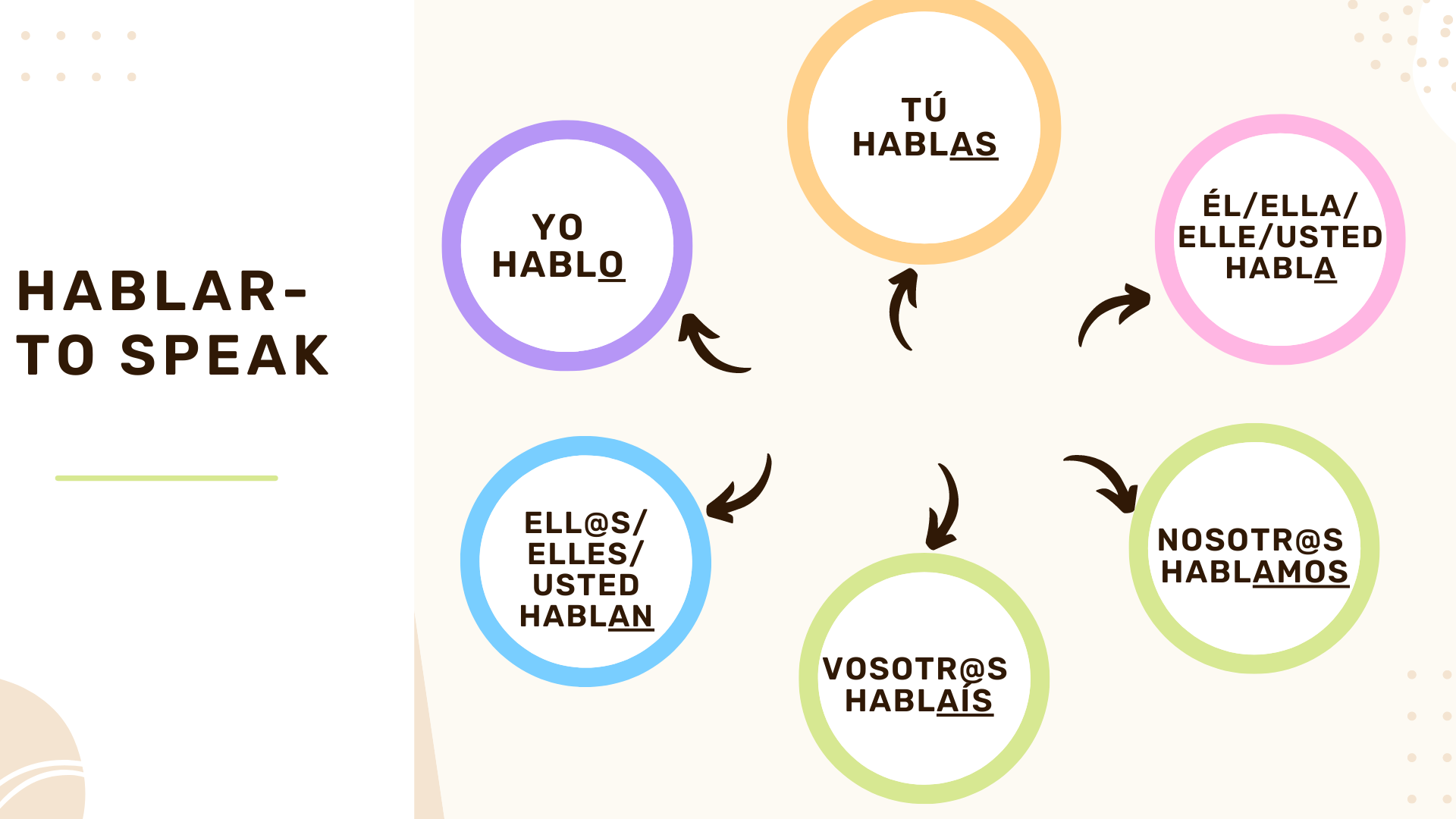13 Las actividades diarias -ar verbs
Emily Frank; Erin Huebener; Handy Acosta Cuellar; Carolina Delgado; Giti Farudi; Yelani Feldman; Isabel Matus; and Jerry Parker
Las actividades diarias: -ar
|
Section Goal: In this section, students will learn how to discuss everyday activities. |
Ellos bailan salsa. Tú cocinas arepas.
You have already learned the present indicative forms of the verbs ser and tener. Now you will learn the present indicative forms of -ar verbs. We use the present indicative to express the following:
To describe routine actions:
Estudias español en la universidad.
You study Spanish at the university.
To say what you are doing right now:
Ahora estudias matemáticas.
Now you’re studying math.
To ask questions about present events:
¿Estudias en la biblioteca después de clase?
Do you study in the library after class?
To describe plans in the immediate future:
Mañana estudias con tus compañeros de clase.
Tomorrow you’re going to study with your classmates.
Conjugating -ar verbs in the present indicative
An infinitive verb is the form of the verb before it has been conjugated to reflect the subject of the verb. Estudiar (to study) is an infinitive. In Spanish, infinitives end in -ar, -er, or -ir. For now, you will learn to conjugate only -ar verbs.
A verb stem is what is left after you remove the -ar, -er, or -ir ending from the infinitive. “Estudi-” is the stem of estudiar.
A conjugated verb is a verb whose endings reflect the person (I, you, he/she, we, you, they) and time (in this case, the present).
To conjugate an -ar verb in the present indicative, simply remove the -ar from the verb and attach the following underlined endings to the stem, depending on the subject.

The verb hablar
|
Subject pronoun (singular) |
Verb conjugation |
Subject pronoun (plural) |
Verb conjugation |
|
Yo |
hablo |
Nosotros/ Nosotras |
hablamos |
|
Tú |
hablas |
Vosotros/ Vosotras |
habláis |
|
Él/Ella/Elle |
habla |
Ellos/Ellas/Elles |
hablan |
|
Usted |
habla |
Ustedes |
hablan |
To form a complete sentence using the present indicative of -ar verbs, remember to follow basic Spanish sentence structure: Subject + verb + when / where / what / with whom, etc.
Yo+ miro+ televisión los fines de semana.
I+ watch+ tv on the weekends.
Remember that in Spanish, subject pronouns are only necessary to emphasize or clarify.
Yo miro televisión. Vs. Miro televisión.
Usted camina en el parque. Vs. Camina en el parque.
To say what you do not do, place “no” before the conjugated verb.
No trabajo los fines de semana.
I do not work on the weekends.
Certain present tense conjugations can be followed by infinitives. However, we cannot use two conjugated verbs together unless they are separated by a comma or y (and), pero (but), or o (or).
Necesitamos estudiar el vocabulario.
We need to study vocabulary.
Los viernes trabajo, ceno con amigos y descanso.
On Fridays, I work, eat dinner with friends, and rest.
To form a yes or no question, add question marks to a present tense sentence.
¿Trabajas los fines de semana?
Do you work on weekends?
Vocabulario
Regular -ar verbs referring to pastimes and activities
Alquilar (películas) – to rent (movies)
Bailar – to dance
Caminar – to walk
Cantar – to sing
Cocinar – to cook
Descansar – to rest
Escuchar (música) – to listen to (music)
Estudiar (en la biblioteca, en casa) – to study (in the library, at home)
Hablar (por teléfono) – to talk (on the phone)
Levantar pesas – to lift weights
Mirar (televisión) – to watch (television)
Nadar – to swim
Navegar por internet to – surf the web
Patinar – to skate
Pintar – to paint
Practicar deportes – to practice/play sports
Sacar fotos – to take photos
Tocar un instrumento musical – to play a musical instrument*
Tomar un refresco – to drink a soft drink
Tomar el sol – to sunbathe
Viajar – to travel
Visitar a amigos – to visit friends
*Instruments:
La guitarra – the guitar
El piano – the piano
La trompeta – the trumpet
El violín – the violin
La batería – drums
La flauta – the flute
Additional -ar verbs:
Acabar (+infinitivo) – to have just
Apagar – to turn off
Buscar – to look for
Cenar – to eat dinner
Comprar – to buy
Desear (+infinitivo) – to desire, to want (to)
Limpiar – to clean
Llamar – to call
Llegar – to arrive
Necesitar (+infinitivo) – to need (to do something)
Pasar – to pass
Preparar – to prepare
Trabajar – to work
Usar – to use
Actividad 2. ¿Quién es?
Instructions: Match each subject with the correct activity.
____ Yo a. toca el piano.
____ Tú b. practico deportes
____ Mi compañera de cuarto c. bailan los viernes
____ Joaquín y yo d. estudias en la biblioteca
____ Elena y Gabriela e. cenamos con amigos
Actividad 3. La vida de Juan
Instructions: Complete the paragraph with the correct conjugation of the verb in parentheses.
Modelo: Mi compañero de cuarto y yo preparamos (preparar) la cena.
Yo soy Juan y tengo una vida loca. Mi compañero de cuarto Miguel y yo 1.___________________ (tomar) seis clases este semestre. Miguel también 2.___________________ (trabajar) quince horas a la semana (a week) en la biblioteca. Yo 3.___________________ (necesitar) más dinero, pero no 4.___________________ (trabajar) porque 5.___________________ (tocar) el piano en una banda de jazz. Dos días a la semana yo 6.___________________ (enseñar) español a unos chicos de la escuela primaria (elementary school). ¡Ellos 7.___________________ (practicar) mucho! Por la noche, Miguel y yo 8.___________________ (estudiar) o 9.___________________ (hablar) por teléfono con nuestras novias. A veces (sometimes), ellas 10.___________________ (cenar) con nosotros. Los sábados, yo 11.___________________ (bailar) en las fiestas con mi novia Carmen, y los domingos, nosotros 12.___________________ (descansar).
Actividad 4. ¿Qué hacen?
Instructions: Say what the following people do on the indicated days and times. Follow the model.
Vocabulario útil:
Viernes – Friday
Sábado – Saturday
Domingo – Sunday
La mañana – morning
La tarde – afternoon
La noche – night
Modelo:
Example: Tus amigos y tú________los viernes por la tarde
Answer: Tus amigos y tú practican deportes los viernes por la tarde.
Yo_________ los domingos por la tarde
Mi compañero(a) de cuarto_____________los viernes por la noche
Mis padres______________los sábados por la mañana
Mis amigos y yo_______________ los sábados por la noche
Actividad 5. Preguntas personales
Instructions: Answer the following questions using –ar verbs. Be sure to conjugate the verb so that you have a complete sentence! Then, interview a classmate in Spanish.
Modelo: ¿Limpias tu cuarto todos los días?
Sí, yo limpio mi cuarto.
¿Hablas otra lengua? _________________________________________
¿Tocas algún instrumento? _____________________________________
¿Cantas en el carro? __________________________________________
¿Bailas mucho (a lot)? _________________________________________
¿Estudias mucho? ___________________________________________
¿Trabajas? ________________________________________________
¿Cocinas bien? _____________________________________________
Actividad 6. Habilidades
Instructions: In groups, say what you do very well, and what you do not do well.
Step 1: Mention at least three different skills or activities. Use the vocabulary above.
Modelo: Cocino muy bien, pero pinto muy mal.
Step 2: Then, summarize your group’s abilities using the third person.
Modelo: Elena y David cocinan muy bien, pero Marta cocina muy mal.
Actividad 7. Encuesta
Instructions: Ask your classmates if they do the activities listed below. Keep a tally of how many classmates answer affirmatively and how many answer negatively. Then, write complete sentences saying what your classmates do.
Modelo: Tocar un instrumento
You ask: ¿Tocas un instrumento?
Your partner answers: Sí, toco un instrumento. OR No, no toco un instrumento.
You write: Cinco estudiantes tocan un instrumento.
tocar un instrumento Sí: _________ No: _________
estudiar en la biblioteca Sí: _________ No: _________
escuchar música mientras(while) estudiar Sí: ________ No: ________
bailar con amigos los fines de semana Sí: _________ No: _________
viajar en el verano Sí: _________ No: _________
caminar a las clases Sí: _________ No: _________
cocinar con frecuencia Sí: _________ No: _________
Actividad 8. Las actividades de los estudiantes
Instructions: Choose the correct verb from the word bank to make the sentences make sense, then conjugate it.
|
ayudar – llegar – cantar – mirar – trabajar caminar – llamar – escuchar – tomar |
1. Los fines de semana yo __________________ una película con mi novio.
2. Sara __________________ a su familia por teléfono todos los domingos.
3. ¿Tú __________________ música cuando estudias?
4. Mi hermano y yo __________________ en un supermercado.
5. Cristóbal siempre __________________ a su abuela en el jardín.
6. Ustedes __________________ en el parque todas las mañanas.
7. Nosotras __________________ en la banda de la universidad, ¿verdad?
8. Los estudiantes __________________ muchas clases este semestre.
9. Usted __________________ a casa a las cinco todos los días.

- "Describing what you do: the present indicative of -ar verbs" by Julia Farmer Jeff Zamostny Laura Hill Stephanie Henderson Hollenbeck is licensed under CC BY 4.0 ↵
- Adapted from "Section 3.3 ¿Caminas a la universidad?" by Brown, Erica Escudero, Alejandra Montoya, María Cristina Small, Elizabeth is licensed under CC BY 4.0. ↵

